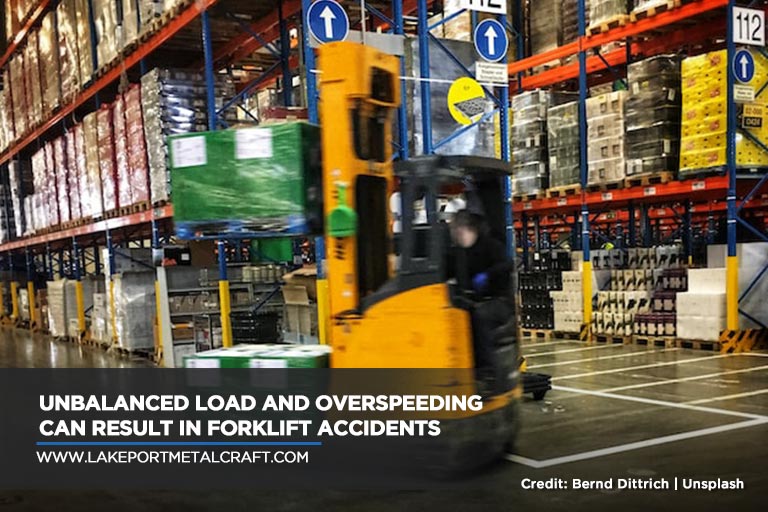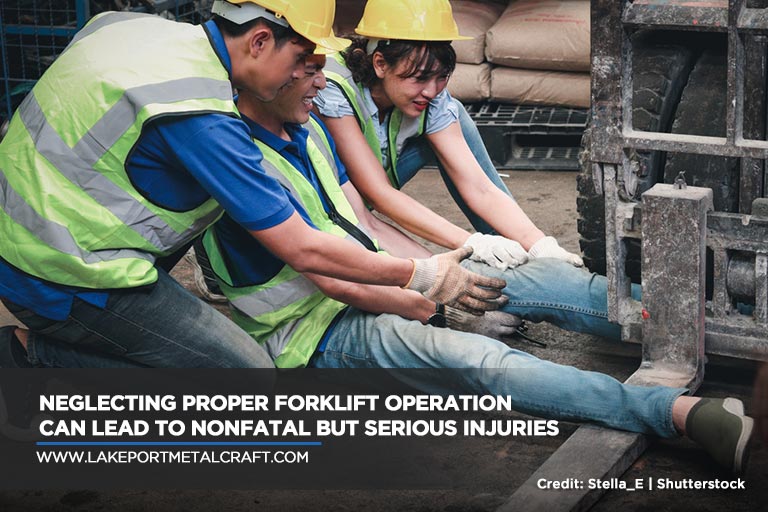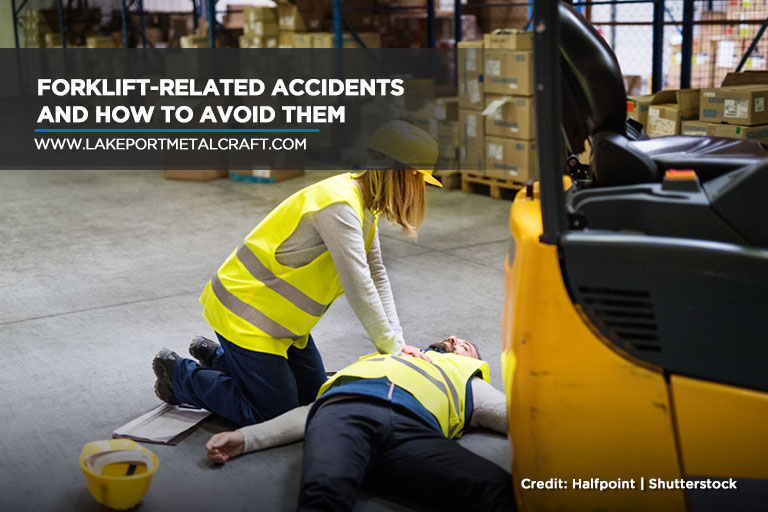CTV News Toronto reported in April 2022 that a man died after getting hit by an industrial forklift at a Hamilton, Ontario, worksite. With thousands of forklifts operating in Canadian warehouses and factories today, forklifts continue to be a serious workplace hazard.
Although forklift accidents account for only 1% of warehouse or factory casualties, they are responsible for 11% of all physical injuries in various workplaces. Different factors contribute to forklift accidents — load block vision, unbalanced loads, inexperienced operators, forklift mechanical failure, and many others.
Minor forklift accidents can result in significant work-related deaths and non-fatal injuries to workers and non-workers alike. Warehouse managers can incorporate ways to avoid forklift-related accidents and mitigate risks in the workplace, which we will discuss in this blog post. We will identify the causes of forklift accidents, common forklift accidents, and ways you can prevent them.
Cause of Forklift Accidents

Although you may own state-of-the-art forklift equipment, ignoring minor accidents can have devastating consequences. These can impact the operators and pedestrians. A forklift rear post is a safety device that effectively prevents collisions for reach trucks and standup counterbalanced trucks.
Most recent forklift-related accidents are related to faulty machines, such as defective forklift rear-end swings or inaccurate forklift rear axle assembly. It might also be because your unqualified operator was negligent in adding weight to the rear of a forklift. There are plenty of reasons forklift accidents occur, and some of them are the following:
- Poorly trained drivers and operators
- Overspeeding
- Elevated load on a forklift
- Insufficient warnings and markings
- Workplace structure
- Unbalanced loads
- Forklift mechanical failures
Improperly installed forklift rear tow pins can cause significant damage to your equipment and eventually impede business operations. When you fail to address this and other issues, they can result in deaths and serious injuries.
Common Forklift Accidents and Ways to Prevent Them

Below you’ll find a list of common forklift accidents and prevention plans to mitigate the risks in your workplace.
-
Forklift rollovers
According to OSHA statistics, forklift rollovers account for 82 deaths per year. Forklift rollovers are a common type of fatal forklift accident associated with a forklift top-over. This happens when the driver performs improper turning, carries an elevated load, or uses excessive speed.
Prevention Tips:
- Follow the speed limit.
- Slow down, especially when rounding corners.
- Install sensors to alert drivers and pedestrians.
- Avoid travelling with a heavy load.
- Be aware of your surroundings.
- Make sure that you have proper training in operating forklifts.
-
Pedestrian impacts
Statistics show that forklift operators are more likely to injure a co-worker than themselves when operating forklifts, especially with multiple intersections in a specific location. In fact, reports show that nearly 20% of forklift accidents involve a pedestrian, particularly in the construction and manufacturing fields.
Pedestrian impacts can also lead to forklift-related deaths.
Prevention Tips:
- Install barriers.
- Observe proper operator awareness when operating near pedestrians.
- Consider putting up alarms and flashing beacons.
- Put up clear signage.
- Educate operators and pedestrians about the potential hazards of working in a warehouse.
-
Falling loads
On top of being responsible for carrying simple loads like boxes and pallets, forklift operators’ job includes carrying and transporting raw materials, large items, and other loads that can fall if not properly secured.
Falling loads can pose hazards to operators and pedestrians alike. One reason that loads fall might be that you failed to properly attach the rear-mounted forklift to the tractor. Another factor might be the lack of load-bearing backrests.
Prevention tips:
- Avoid loading loose or damaged merchandise.
- Centre the load.
- Conduct proper inspection.
- Be sure to secure the loads before you transport them.
- When retrieving items from packs, avoid jerky movements.
-
Truck falling off a trailer or dock
Another dangerous activity a forklift does is crossing thresholds. One typical result of operator negligence in transporting items through forklifts is a truck falling off lower levels, like a trailer or a dock. Some causes of truck falls might be slippery floors, malfunctioning truck parts, or trailers rolling away.
Prevention tips:
- When approaching the trailer or dock, drive slowly.
- Check the truck’s floor before moving.
- Secure the dock in its place and ensure it’s rated for the weight of the load and the truck.
-
Nonfatal injuries
Operators and nearby workers can sustain non-fatal injuries from cuts, slips, and falls. These injuries should not be taken lightly since they can result in broken bones, internal bleeding, and even head trauma. They can also cause permanent scars. One of the top reasons these injuries happen is when operators prioritize speed and convenience over safety. Another reason might be the lack of aerial lifts or the use of unrestrained lifting platforms.
Prevention tips:
- To operate the forklift safely, the staff must receive proper training.
- Slow down, especially when approaching intersections.
- Utilize appropriate equipment and tools, like a scissor lift and other purpose-built MEWP (mobile elevating work platform).
- Make sure that you are operating a well-maintained forklift.
- Don’t cut corners when transporting.
- Take note of operator and pedestrian traffic.
- Get educated about the proper measures of safe loading and unloading procedures.
-
Forklift crushing
Crushed by forklifts is another leading cause of warehouse injuries and fatalities, specifically pedestrians. Forklift crushing can happen when a pedestrian, for example, is sandwiched or pinned between the truck and a fixed object. This can lead to suffocation, injury, or death, especially when not paid attention to.
Inattentive backing by operators can cause forklifts to crush pedestrians and workers. Another chief cause is unattended loose materials that fall off the forks.
Prevention tips:
- Check the rear of the machine.
- Scan the surroundings, especially behind you, before operating the forklift.
- Avoid driving over pedestrians near fixed objects.
- Make sure the loads are secured, especially heavy or awkward items.
According to statistics, 75 to 100 workers die every year because of forklift accidents, while pedestrians are involved in 20% of non-fatal forklift accidents. A variety of things cause accidents, but the main reasons are faulty machinery and improper operator handling.
Almost all workplaces can be responsible for injuries and other irreversible accidents caused by machine operators and pedestrians. And there are those workspaces that contain heavy and hazardous equipment, like factories and warehouses using forklifts for convenience in carrying and transporting heavy loads. When minor mechanical failures are not attended to, non-serious injuries and deaths can occur.
To avoid significant factory damages, accidents, and injuries in the workplace, here are additional safety measures:
- Ensure that your operators are using well-maintained forklifts.
- Maintain a clean, safe, and organized warehouse.
- Provide training, even for operators who have extensive forklift-operating experience.
- Post speed limit signs.
- Put up sufficient markings and warning signs.
- Ride in properly secured forklift seats.
- Avoid carrying loose, heavy, and unsecured loads.
- Be vigilant while carrying loads.
- Don’t drive with packages and other objects blocking your sight.
- Conduct regular inspections of your forklifts.
Lastly, prioritize your workers’ safety at all times with proper machinery. And what better way to avoid catastrophic, life-altering injuries, and death caused by forklift-related accidents than buying protection for reach trucks and standup forklifts?
To safeguard your forklift drivers, buy reliable rearguards. Get The Backbone today! You can call 416-587-5809 for technical information and factory direct orders.


